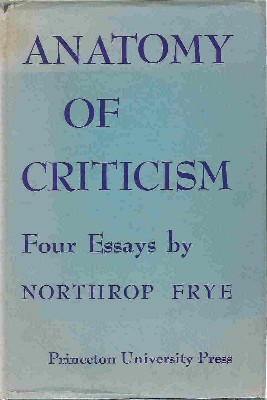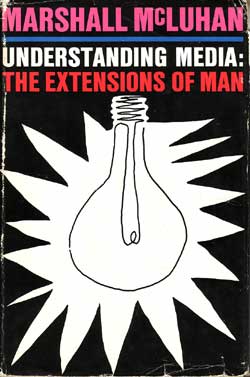

I heard B.W. Powe’s paper on Frye and McLuhan at this year’s Frye Festival in Moncton. It covered a lot of ground and was powerfully rendered. On a couple of occasions Powe seemed to suggest that Frye was in some way envious of and threatened by McLuhan. He cited this anecdote from George Steiner:
Many years ago, one evening in Massey College, I sat with Robertson Davies, Norrie Frye, Kathleen Coburn (the world’s greatest Coleridge scholar), when there walked in a very much younger Marshall McLuhan. Astounded, and without thinking, I turned to Professor Frye, and said, “There’s Marshall McLuhan.” I cannot hope to reproduce the air of sardonic melancholy which immediately invaded Norrie’s features. He had a long look, and said, “So the man alleges.”
If I understood Powe’s point in citing this passage, a display of envy does not seem to be the best interpretation of it. Frye’s references to McLuhan in the Collected Works are evidence of his consistently frank and even-handed appraisal of McLuhan. I think his often repeated concern that McLuhan’s celebrity compromised his full potential as a scholar offers a better read on what Steiner describes as Frye’s “sardonic melancholy.” Frye’s response, “So the man alleges,” similarly recalls his frequent dismissal of the “McLuhan cult” (or as he more pungently puts it at one point, “the McLuhan rumour”) in order to maintain at least some distinction between the scholar and the media guru.
Thanks to the nearly twenty thousand words related to McLuhan that Frye committed to paper, we can see that Frye confidently read him, confidently saw beyond the misguided “nitwit McLuhanism” he inspired, and confidently disagreed with him for reasons he was always willing to articulate in detail. Frye often cites and lucidly critiques McLuhan’s characterization of the “global village” and his distinction between “linear” and “simultaneous” perception. At the same time, he is also characteristically generous wherever McLuhan might be effectively cited (and, again, there are scores of such citations amounting to thousands of words), even if he remained vigilant wherever he thought McLuhan might be reasonably challenged. Throughout it all, Frye regards McLuhan as a scholar first. He in fact observes a number of times that McLuhan was celebrated for the wrong reasons in the 1960s and then ignored for the wrong reasons in the 1970s. Perhaps most tellingly, there is no indication of any sustained personal hostility toward McLuhan himself, whatever their professional differences. In an interview after McLuhan’s death, Frye refers to him as “my beloved colleague.”
If there is any manifest expression of resentment, and even paranoia, in this relationship, it appears to have come from McLuhan’s side. According to Philip Marchand‘s biography, Marshall McLuhan: the Medium and the Messenger, he had a long held belief that he had been targeted by a worldwide Masonic conspiracy. Frye was at least peripherally implicated:
McLuhan had sense enough not to express these views in public, and by the 1960s he pretty well kept quiet about the Masons even with friends and colleagues at St. Michael’s, although, appalled by the post-Vatican II changes in the church, he occasionally voiced the suspicion that some prelates of the church, including Toronto Archbishop Philip Pocock, were secretly Masons. He seems never really to have abandoned his thesis about a Masonic conspiracy and even wondered occasionally whether some of his own employees at the Centre for Culture and Technology (established at the University of Toronto in 1963) might be Masons.
He certainly never abandoned his belief that his great rival in the English department at the University of Toronto, Northrop Frye, was a Mason at heart, if not in fact. (114)
McLuhan seems to have possessed an aggressive personal animosity toward Frye. According to Marchand, McLuhan considered him an “enemy” early in their careers together in the English department at the University of Toronto, and then in later life Frye is referred to as his “old enemy.” McLuhan’s enmity was evidently a longstanding one. The other references to Frye in Marchand’s book do not vary much from this theme.
As already promised, I will be writing a longer paper in which I will provide a more extended and detailed account of Frye’s reading of McLuhan.